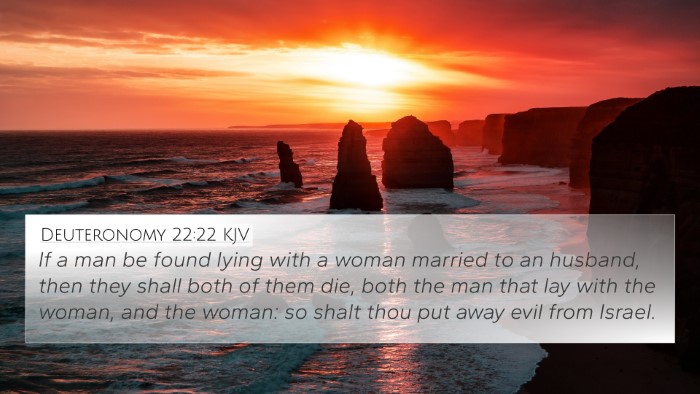Old Testament
Genesis Exodus Leviticus Numbers Deuteronomy Joshua Judges Ruth 1 Samuel 2 Samuel 1 Kings 2 Kings 1 Chronicles 2 Chronicles Ezra Nehemiah Esther Job Psalms Proverbs Ecclesiastes Song of Solomon Isaiah Jeremiah Lamentations Ezekiel Daniel Hosea Joel Amos Obadiah Jonah Micah Nahum Habakkuk Zephaniah Haggai Zechariah MalachiRomans 7:3 Similar Verses
Romans 7:3 Cross References
So then if, while her husband liveth, she be married to another man, she shall be called an adulteress: but if her husband be dead, she is free from that law; so that she is no adulteress, though she be married to another man.
Uncover the Rich Themes and Topics of This Bible Verse
Listed below are the Bible themes associated with Romans 7:3. We invite you to explore each theme to gain deeper insights into the Scriptures.
Romans 7:3 Cross Reference Verses
This section features a detailed cross-reference designed to enrich your understanding of the Scriptures. Below, you will find carefully selected verses that echo the themes and teachings related to Romans 7:3 KJV. Click on any image to explore detailed analyses of related Bible verses and uncover deeper theological insights.

Matthew 5:32 (KJV) »
But I say unto you, That whosoever shall put away his wife, saving for the cause of fornication, causeth her to commit adultery: and whosoever shall marry her that is divorced committeth adultery.

John 8:3 (KJV) »
And the scribes and Pharisees brought unto him a woman taken in adultery; and when they had set her in the midst,

1 Samuel 25:39 (KJV) »
And when David heard that Nabal was dead, he said, Blessed be the LORD, that hath pleaded the cause of my reproach from the hand of Nabal, and hath kept his servant from evil: for the LORD hath returned the wickedness of Nabal upon his own head. And David sent and communed with Abigail, to take her to him to wife.

Ruth 2:13 (KJV) »
Then she said, Let me find favor in thy sight, my lord; for that thou hast comforted me, and for that thou hast spoken friendly unto thine handmaid, though I be not like unto one of thine handmaidens.

Deuteronomy 22:22 (KJV) »
If a man be found lying with a woman married to an husband, then they shall both of them die, both the man that lay with the woman, and the woman: so shalt thou put away evil from Israel.

Numbers 5:13 (KJV) »
And a man lie with her carnally, and it be hid from the eyes of her husband, and be kept close, and she be defiled, and there be no witness against her, neither she be taken with the manner;

Leviticus 20:10 (KJV) »
And the man that committeth adultery with another man's wife, even he that committeth adultery with his neighbor's wife, the adulterer and the adulteress shall surely be put to death.

1 Timothy 5:11 (KJV) »
But the younger widows refuse: for when they have begun to wax wanton against Christ, they will marry;
Romans 7:3 Verse Analysis and Similar Verses
Understanding Romans 7:3
Romans 7:3 states: "So then if, while her husband liveth, she be married to another man, she shall be called an adulteress: but if her husband be dead, she is free from that law; so that she is no adulteress, though she be married to another man." This verse uses the metaphor of marriage to illustrate the believer's relationship to the law and to Christ.
Summary of Insights
This verse conveys deep spiritual truths regarding the transition from the law to grace. Here’s a summary of insights from public domain commentaries:
- Matthew Henry: He emphasizes the importance of the believer's freedom from the law through the death of Christ. Just as a widow is free to remarry, so are we free to belong to Christ once we have died to the law.
- Albert Barnes: Barnes highlights the idea of being "dead to the law" through the body of Christ. He interprets this as a transformative action that allows believers to be united with Him and thus produce new spiritual fruit.
- Adam Clarke: Clarke discusses the implications of this analogy in relation to Jewish customs regarding marriage and law. He explains that the law had dominion over an individual only as long as they lived, and death releases one from that obligation.
Key Themes from the Verse
The primary themes present in Romans 7:3 include:
- Death and Freedom: The concept of death liberating one from the law mirrors our dying to sin through Christ’s sacrifice.
- Adultery as a Metaphor: The spiritual implications of marital fidelity speak to covenant faithfulness in God, revealing how we should relate to Christ.
- New Covenant Relationship: This verse marks the shift from the Old Covenant (law) to the New Covenant (grace), emphasizing how believers are now bound to Christ rather than the law.
Cross-Referencing Biblical Texts
To deepen the understanding of Romans 7:3, we can explore related verses that illuminate its themes:
- Galatians 2:19-20: Discusses being dead to the law through Christ, illustrating the believer’s new life.
- 2 Corinthians 5:17: Connects with the notion of becoming a new creation in Christ, aligning with the themes of death and resurrection.
- Colossians 2:14: Highlights how the debt of law was canceled by Christ’s death, freeing believers from its binding nature.
- Romans 6:4: Speaks to the believer being buried with Christ and thus raised to walk in newness of life.
- Ephesians 2:15: Explains how Christ abolished the law of commandments to create a new unity among believers.
- Hebrews 7:12: References the change in priesthood, signifying the transition from the laws of the Old Covenant.
- Matthew 5:17: Where Jesus clarifies that He came not to abolish the law but to fulfill it, linking the two covenants.
Thematic Connections
Romans 7:3 also relates to various thematic Bible verse connections. Here are a few:
- Faithfulness vs Unfaithfulness: The theme of fidelity can be seen in several parables of Jesus, including the Parable of the Ten Virgins (Matthew 25:1-13).
- Grace vs Law: This is a theme consistently explored in Paul's letters, especially in Romans 3:20-22.
- Christian Freedom: Similar themes appear in Galatians 5:1 as believers are encouraged to stand firm in their freedom in Christ.
Cross-Reference Study Tools
For those wanting to dive deeper into cross-referencing biblical texts, here are some recommended tools:
- Bible Concordance: Useful for finding themes and connections across scripture.
- Bible Cross-reference Guide: A handy resource to see how verses relate to one another.
- Cross-reference Bible Study: This method enhances understanding of thematic consistencies in the Bible.
Conclusion
Romans 7:3 offers profound insight into the transformational relationship believers have with the law through Christ. Understanding this verse within the greater context of scripture, especially through cross-referencing, enriches our comprehension of Biblical themes and connections. Engaging in a comparative Bible verse analysis not only clarifies this passage but also encourages exploration into related verses and themes throughout the Scriptures, thus providing a fuller picture of God's redemptive story.




